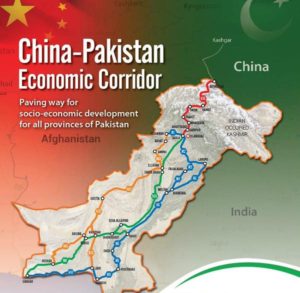by Qura tul ain Hafeez 27/2/2018
CPEC is a great opportunity to enhance Pakistan’s economy. The new commercial and economic businesses nevertheless encompass certain security issues pertaining to the development and implementation of the new projects under the Long-Term Projects (LTP – 2018 to 2030). These challenges and threats are internal as well as external. As far as the internal security issues are concerned, Pakistan is facing the brunt of the extremism and terrorism. Baluchistan is considered as the most sensitive province in this regard. It is the largest province of Pakistan according to its area and the smallest in terms of population. When measured against socio-economic standings of other provinces, Balochistan is the least developed. Its society is still plagued with tribal structures. Although the province is rich in resources, insufficiency of capital and absence of skilled population is a hindrance in utilizing those resources to the maximum. CPEC is an opportunity for improving the economic and security situation of Balochistan province. It not only connects China’s north-western region of Xinjiang to Gwadar port but will bring trade through Europe, Africa, Oceania, and the Middle East.
Baluchistan’s political stability and security are pivotal to the success of Gwadar port and infrastructural projects of CPEC. The inhabitant Baloch tribes consider CPEC injustice to the people of Baluchistan and deprivation to the local Baloch. However, in order to overcome any kind of unpleasant activities Pakistan government has established a separate Security division of 2,000-strong force, devoted to protecting national and Chinese interests in Pakistan. There is also news prevailing in the international media that “China is holding secret talks with the Baloch tribes for the security of CPEC related infrastructural projects”. The officials from Pakistan acknowledge such efforts on part of China. Being a large province of Pakistan, it is important to resolve the grievances of Baloch. The international media is portraying this news as if China is doing something wrong but the settlement of interprovincial disputes is very much important for CPEC.
The prosperity of Baloch people lies in the peace of Balochistan and the economic corridor is very unlikely to be successful unless there is peace in Gwadar. But there are some anti-nationalistic elements that want the underdeveloped provinces of Pakistan to remain in darkness. In such circumstances, it’s important to resolve the conflict and mitigate it rather than escalating. There is a need for the proper mechanism of conflict management while minimizing the negative outcomes and maximizing the positive ones. According to Thomas Killman, the five steps of conflict management includes accommodating, avoiding, collaborating, compromising and competing. These strategies are applicable depending upon the nature of the conflict. Considering the CPEC and the provincial grievances, all these strategies are not applicable. However, accommodating the conflict is possible with collaboration. The CPEC-LTP envisages broad parameters for the development of Provinces in order to accommodate the conflict. The LTP emphasizes that the province’s priorities would be honored at first. Special economic zones have been prioritized in all the provinces of Pakistan with industrial Parks, energy security, and infrastructural developments.
The CPEC conflict accommodation essentially entails offering the Bloch what they want. The use of accommodation often occurs when one of the parties wishes to keep the peace. Therefore, negotiations between Baloch tribes and the Chinese official will be good for the implementation of the CPEC Projects. After accommodation of the conflict, next step is collaboration. Collaboration with Baloch tribes and Chinese investors will bring ideas of mutual interests to find a creative solution acceptable to everyone. In an interview with the BBC Urdu on 2nd February 2018, Chinese ambassador to Pakistan Mr. Yao Jing said that “militants in Balochistan were no longer a threat to the economic corridor”. While the tribes’ statement reveals that they will not oppose the CPEC projects as long as their financial benefits will be taken into account. A provincial tribal leader stated, “ Today, young men are not getting attracted to join the insurgents and many people see prosperity as a result of the CPEC”. This shows if there are discussions between the two parties then they are beneficial for the CPEC security. And if the above strategies of conflict management will be adopted then the challenges to the CPEC will be overcome sufficiently.

